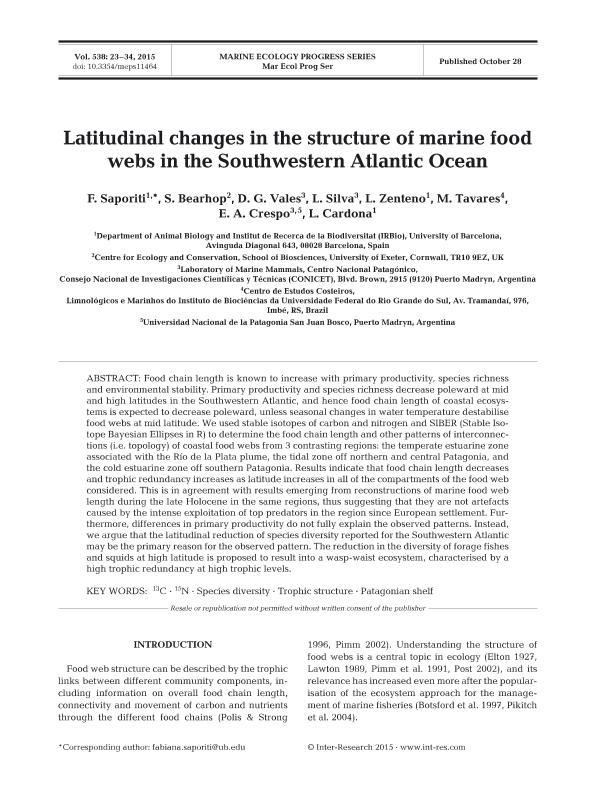Mostrar el registro sencillo del ítem
dc.contributor.author
Saporiti, Fabiana

dc.contributor.author
Bearhop, Stuart

dc.contributor.author
Vales, Damián Gustavo

dc.contributor.author
Silva, Laura Alejandra

dc.contributor.author
Zenteno, Lisette

dc.contributor.author
Tavares, Mauricio
dc.contributor.author
Crespo, Enrique Alberto

dc.contributor.author
Cardona, Luis

dc.date.available
2018-05-10T14:39:42Z
dc.date.issued
2015-10
dc.identifier.citation
Saporiti, Fabiana; Bearhop, Stuart; Vales, Damián Gustavo; Silva, Laura Alejandra; Zenteno, Lisette; et al.; Latitudinal changes in the structure of marine food webs in the Southwestern Atlantic Ocean; Inter-Research; Marine Ecology Progress Series; 538; 10-2015; 23-34
dc.identifier.issn
0171-8630
dc.identifier.uri
http://hdl.handle.net/11336/44748
dc.description.abstract
Food chain length is known to increase with primary productivity, species richness and environmental stability. Primary productivity and species richness decrease poleward at mid and high latitudes in the Southwestern Atlantic, and hence food chain length of coastal ecosystems is expected to decrease poleward, unless seasonal changes in water temperature destabilise food webs at mid latitude. We used stable isotopes of carbon and nitrogen and SIBER (Stable Isotope Bayesian Ellipses in R) to determine the food chain length and other patterns of interconnections (i.e. topology) of coastal food webs from 3 contrasting regions: the temperate estuarine zone associated with the Río de la Plata plume, the tidal zone off northern and central Patagonia, and the cold estuarine zone off southern Patagonia. Results indicate that food chain length decreases and trophic redundancy increases as latitude increases in all of the compartments of the food web considered. This is in agreement with results emerging from reconstructions of marine food web length during the late Holocene in the same regions, thus suggesting that they are not artefacts caused by the intense exploitation of top predators in the region since European settlement. Furthermore, differences in primary productivity do not fully explain the observed patterns. Instead, we argue that the latitudinal reduction of species diversity reported for the Southwestern Atlantic may be the primary reason for the observed pattern. The reduction in the diversity of forage fishes and squids at high latitude is proposed to result into a wasp-waist ecosystem, characterised by a high trophic redundancy at high trophic levels.
dc.format
application/pdf
dc.language.iso
eng
dc.publisher
Inter-Research

dc.rights
info:eu-repo/semantics/openAccess
dc.rights.uri
https://creativecommons.org/licenses/by-nc-sa/2.5/ar/
dc.subject
Species Diversity
dc.subject
Trophic Structure
dc.subject
Patagonian Shelf
dc.subject
13c ? 15n
dc.subject.classification
Otras Ciencias Biológicas

dc.subject.classification
Ciencias Biológicas

dc.subject.classification
CIENCIAS NATURALES Y EXACTAS

dc.title
Latitudinal changes in the structure of marine food webs in the Southwestern Atlantic Ocean
dc.type
info:eu-repo/semantics/article
dc.type
info:ar-repo/semantics/artículo
dc.type
info:eu-repo/semantics/publishedVersion
dc.date.updated
2018-05-02T18:15:24Z
dc.identifier.eissn
1616-1599
dc.journal.volume
538
dc.journal.pagination
23-34
dc.journal.pais
Alemania

dc.journal.ciudad
Oldendorf/Luhe
dc.description.fil
Fil: Saporiti, Fabiana. Universidad de Barcelona. Facultad de Biología. Departamento de Biología Animal; España
dc.description.fil
Fil: Bearhop, Stuart. University of Exeter; Reino Unido
dc.description.fil
Fil: Vales, Damián Gustavo. Consejo Nacional de Investigaciones Científicas y Técnicas. Centro Nacional Patagónico; Argentina
dc.description.fil
Fil: Silva, Laura Alejandra. Consejo Nacional de Investigaciones Científicas y Técnicas. Centro Nacional Patagónico; Argentina
dc.description.fil
Fil: Zenteno, Lisette. Universidad de Barcelona. Facultad de Biología. Departamento de Biología Animal; España
dc.description.fil
Fil: Tavares, Mauricio. Universidade Federal do Rio Grande do Sul; Brasil
dc.description.fil
Fil: Crespo, Enrique Alberto. Consejo Nacional de Investigaciones Científicas y Técnicas. Centro Nacional Patagónico; Argentina
dc.description.fil
Fil: Cardona, Luis. Universidad de Barcelona. Facultad de Biología. Departamento de Biología Animal; España
dc.journal.title
Marine Ecology Progress Series

dc.relation.alternativeid
info:eu-repo/semantics/altIdentifier/url/http://www.int-res.com/abstracts/meps/v538/p23-34/
dc.relation.alternativeid
info:eu-repo/semantics/altIdentifier/doi/http://dx.doi.org/10.3354/meps11464
Archivos asociados
